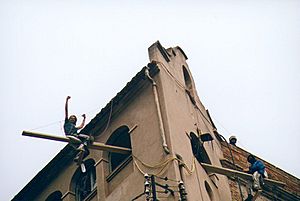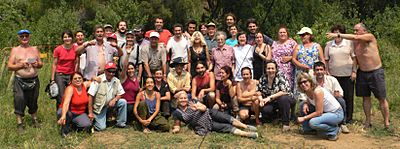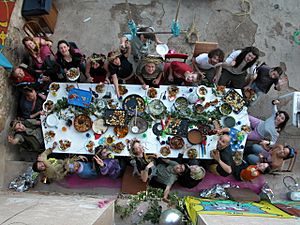Can Masdeu facts for kids
Quick facts for kids Can Masdeu |
|
|---|---|
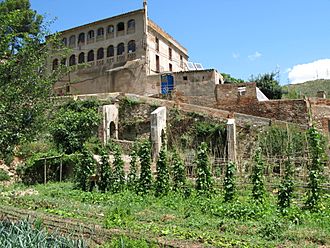
Can Masdeu has some of the largest community gardens in Barcelona.
|
|
| General information | |
| Country | Spain |
| Coordinates | 41°26′44″N 2°9′27″E / 41.44556°N 2.15750°E |
Can Masdeu (Catalan pronunciation: [ˈkam məzˈðew]) is a special kind of community centre and home located in Collserola Park, just outside Barcelona, Spain. It's also a place with large community gardens. The building used to be a hospital, owned by Sant Pau hospital. It was empty for about 53 years before a group of people from different countries moved in during 2001.
Most Sundays, from late September to early June, Can Masdeu opens its doors. You can take a tour and learn how the community lives. They'll show you how they make decisions together, grow food in an eco-friendly way, and run their social centre. There's often a shared meal, and about 100 people come to join in free activities. These activities are all about protecting nature, taking action for good causes, and learning to be self-sufficient.
Contents
What Does Can Masdeu Mean?
The name Can Masdeu has a few meanings. "Can" means "property of" in Catalan. "Masdeu" comes from the Masdeu family, who once lived in the main farmhouse. So, Can Masdeu can refer to:
- The masia – this is a traditional Spanish farmhouse or large country home.
- The valley or the community gardens found there.
- The group of people who live and work there.
- The social centre itself, or the environmental projects they do.
- A former nunnery or hospital that used to be in the farmhouse and valley.
The Land and Its History
The area managed by the community at Can Masdeu is quite large. It includes almost a hectare (about 2.5 acres) of land used for gardens. There's also an old nunnery and hospital building. Plus, there are about 15 hectares (37 acres) (37 acres) of mostly hilly forests. The main building has four floors and is built into the side of a hill. It has 24 different rooms, including a big hall.
Can Masdeu is located up a hill from the Canyelles L3 Metro station in Barcelona. You'll see a sign for it before a 0.5 km (0.31 mi) walk up a dirt road to get there.
The building stands on an old Roman site. In the past, vineyards surrounded it before Barcelona grew into the Nou Barris area. The oldest part of the current building, the temple (or masia), was finished in the 17th century. In the early 1900s, living areas, common spaces, and a kitchen were added. After being a nunnery for some years, it became a hospital for people with leprosy. It was finally closed and left empty in 1948. People might have been afraid of leprosy, which could be why such a large place was left empty for over 50 years.
How Can Masdeu Was Occupied
A group of people from different countries spent over a year looking for the best place in Barcelona to start a community project. In December 2001, they moved into the abandoned hospital. Their goal was to hold a meeting to teach people about climate change. Can Masdeu became well-known in April 2002. More than 100 police officers came to try and remove 11 people living there.
The people inside used passive resistance (peaceful ways to resist). For three days, they managed to stop the police from forcing them out. They used clever methods to stay in control of the space. For example, they tied themselves to risky spots outside the building. This made it dangerous for the police to try and remove them without causing serious injury. Some people hung outside the building, while others balanced on a long seesaw. If one person was removed from the seesaw, the other would fall. They even used a bathtub to hang from the building!
The police changed their plan. Instead of forcing them out, they decided to wait for the people to get thirsty and hungry. But the community stayed put for three days. During this time, more and more local people came to support them. Many spectators came to watch, chanting slogans and stopping traffic on the nearby road. A group in the Netherlands even protested at the Spanish Embassy there. After three days, the judge in Barcelona ordered the police to leave. The judge's decision showed that human rights and safety are more important than property rights.
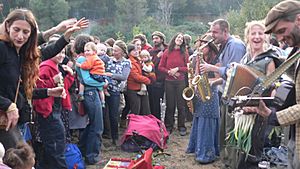
Since 2002, there have been legal challenges against the people living at Can Masdeu. Most of these cases have been difficult for the community. However, they continue to live there. This is partly because the hospital that owns the building doesn't have enough money to fix it up. Also, right next to Can Masdeu, there's another larger abandoned building. This other building could be used more easily than the older, more run-down Can Masdeu.
Working with Neighbors
The people living at Can Masdeu have worked hard to have good relationships with their neighbors. Right after they moved in, they invited local gardeners to come and plant on their land. About a dozen people, mostly older women, took up the offer. They started planting mostly vegetables and some flowers.
The community hosts monthly or bi-monthly potlucks with the local gardeners. They also have regular meetings to manage the gardens. In 2006, a large second area of gardens was cleared from the surrounding bushes. More local gardens were planted there. Now, there are three levels of gardens. The lowest level has the newer local gardens. The middle level is where the community grows food for themselves. The top level has the original local gardens. These neighbors first came from the Nou Barris district. But even if they move to nearby places, they often keep coming back to this site to tend their garden plots.
Social Centre Activities
Most Sundays, from late September to early June, the social centre at Can Masdeu offers public workshops. This centre is called the PIC, or Punt d'Interració de Collserola (Interaction Point of Collserola). These workshops and presentations cover many different topics, such as:
- Environmental issues and how to protect our planet.
- Permaculture and organic farming (growing food naturally).
- Learning about intentional communities (groups of people living together on purpose).
- Understanding resistance movements and peaceful protests.
- Showing independent films.
- Music, dancing, and other cultural activities.
- Guided walks around the community grounds and building.
An organic vegetarian meal is served for about 5 euros. The Social Centre and the 'Rurbar' (a cafe serving local and organic meals and drinks) are usually open on Sundays from noon until evening. You can find out about activities on their website, Facebook page, and in the Infousurpa newsletter.
Renovations and How It Works
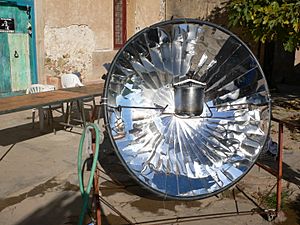
A lot of work was needed to make the space suitable for living. The people cleared out rooms and fixed them up. They worked on the nearby areas for over three years. Residents live a lifestyle that uses little energy and has a low impact on the environment. They use only a few low-power electrical items and have a couple of wood stoves for the large building.
The community runs a bike shop where they fix bikes. They bake bread for themselves and for local customers. They also provide space for the local high school to hold meetings and performances. Additionally, they host meetings for groups working for positive change and resistance.
Can Masdeu Today
As of 2018[update], 24 adults and 5 children live and share the house at Can Masdeu. Being part of the community means attending meetings every two weeks. It also involves organic gardening, doing housework, and sharing two collective meals each day. Each member contributes 100 euros per month for general costs. Many members also work outside the house. However, some have small businesses within the community, like making beer, floor chairs, herbal remedies, or organic catering.
The main languages spoken in the house are Catalan and Spanish. But since it's an international group, you might also hear English, Italian, French, Basque, and even Esperanto.
The community sometimes hosts guests. These guests might be friends of the community or people involved in projects or movements that Can Masdeu supports. The community gets many more requests to host people than they can manage.
Unlike many other communities, Can Masdeu has a very low turnover. This means not many people leave. From 2013 to 2018, only about one person left each year.
See also
 In Spanish: Can Masdeu para niños
In Spanish: Can Masdeu para niños
- Consensus decision-making
- De-growth
- Direct Action
- Ecology
- Environmental movement
- Permaculture
- Social movement
- Squatting
 | James Van Der Zee |
 | Alma Thomas |
 | Ellis Wilson |
 | Margaret Taylor-Burroughs |


